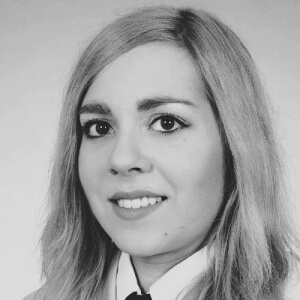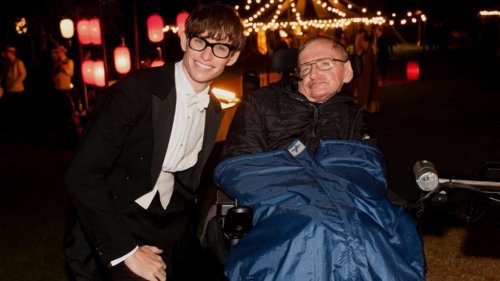The Theory of Everything: Discovering a Genius


Written and verified by the film critic Leah Padalino
Much has been said about Stephen Hawking’s life, his illness, his great sense of humor, and his contributions to physics. The Theory of Everything is a 2014 film by James Marsh. In his film, he tries to bring us closer to the British physicist’s human side. Marsh based the film on the book Traveling to Infinity: My Life with Stephen by Jane Hawking, Stephen’s first wife. In this autobiography, Jane narrates her years with Stephen Hawking.
The movie was critically acclaimed and nominated for several Academy Awards. However, only Eddie Redmayne won the Academy Award for Best Actor.
It wasn’t easy to take this story to the big screen. In particular, it wasn’t easy to get Jane and Stephen’s approval, since it’s a very personal story. When Stephen Hawking saw the first version of the film, he offered his characteristic voice for the movie. Furthermore, he praised Redmayne’s performance and even got emotional.
The Theory of Everything captivates us. Additionally, it brings us closer to the other side of the genius’ life, to a more bitter side. In particular, it shows us a person who was also capable of making mistakes and who possessed an exceptional sense of humor despite having lost his mobility.
The person behind the genius
Sometimes we like to idealize famous people. Namely, we may think that their lives are very different from ours, that they never suffer and are perfect. The Theory of Everything shows us the person behind the genius and the good and the bad in his daily life. It shows us his struggles.
After his death, much has been said about Hawking’s life and scientific work. However, there’s no doubt that he was one of the great geniuses of the 20th and 21st centuries and that the world will always remember him. The Theory of Everything was a homage and a beautiful portrait of that familiar face. Furthermore, it was a tribute to his wife and children as well as a gift to all of the viewers.
Perseverance in The Theory of Everything
The film starts off at a university party in which a young Stephen Hawking meets his future wife, Jane. Both seem very different from each other. He was a scientist and she studied literature. He was an atheist and she was religious. However, they started falling for each other very quickly. A while later, Stephen began to feel the first symptoms of a strange disease. He was diagnosed with an early-onset-slow-progressing motor neuron disease (a form of ALS).
Hawking was diagnosed at the age of 21. During this time, he was preparing his doctoral thesis and a bright future awaited him. However, the doctors assured him that he wouldn’t live for more than two years. For this reason, he decided to stay away from Jane and hide the truth.
When Jane discovered what was happening to Stephen, she decided to stay by his side, no matter what. Stephen Hawking lived a lot longer than that and is an example of perseverance. No wheelchair managed to stop him.

Support in The Theory of Everything
The film shows us young Hawking’s suffering. In particular, we see the fear and the initial denial when he’s diagnosed. Furthermore, we see his internal struggle, anger, and finally acceptance. We go through all of these stages thanks to Eddie Redmayne’s amazing performance, as well as the fundamental Jane, played by Felicity Jones. Despite the odds, Jane and Stephen get married and have three children. Meanwhile, he continued to devote his life to science while Jane took care of everything else.
Jane’s devotion to Stephen is surprising, especially when he refuses to accept help. He refuses to acknowledge that, in a home with three children and a husband who can barely help, Jane feels frustrated. Jane leaves everything behind for him and her family and becomes his amazing support system.
The wonderful thing about The Theory of Everything is that it shows us Hawking’s more human side. Above all, it’s also a tribute to Jane, a woman who was capable of doing anything for love.

Life lessons in The Theory of Everything
The Theory of Everything is also a mirror. It’s a reflection of that world in which we reward certain people for their work, yet cast aside others for the same reason. On more than one occasion, it speaks of the financial problems Jane and Stephen faced at the beginning. Surely, it’s something that we never imagined the genius had to face.
The Theory of Everything shows us the beginning of the genius turned celebrity. But it also reminds us that, unlike rock stars or elite athletes, society doesn’t reward many geniuses. In fact, most don’t achieve recognition until they’re old. On many occasions, a life dedicated to research is no guarantee of success or recognition.
The film reminds us of what’s really important, of the values we must not lose. Furthermore, it reminds us of the importance of having a purpose to be able to keep a fighting spirit despite adversity. Above all, it invites us to embrace our family, our friends, and life because we never know when it’ll all end.
“Life would be tragic if it weren’t funny.”
-Stephen Hawking-

Appreciate life and all of its obstacles
Stephen and Jane believed that time was against them and that Stephen’s life could end at any minute. Therefore, they chose to live knowing that their time was limited and started a family as soon as possible. With this in mind, they chose to enjoy every moment, even if the journey wasn’t always easy. Although they ended up separating, they did it out of love for each other.
Jane had sacrificed everything for Stephen. Stephen made the decision that they should follow different paths. And while the idea may seem crazy, selfish, and irrational, it really wasn’t. Jane had a second chance at life, although she still cared about Stephen.
Once again, I have to applaud Redmayne’s performance. Redmayne was a really touching and natural Hawking. The Theory of Everything is a great movie to remember Stephen Hawking by. It also reminds us that nobody escapes death. Additionally, it helps us remember that everyone is human and how important laughter is.
Life is full of adversities and obstacles. However, we must never forget that we’re the ones who choose how we face them. We get to choose how we want to experience this journey called life.
Much has been said about Stephen Hawking’s life, his illness, his great sense of humor, and his contributions to physics. The Theory of Everything is a 2014 film by James Marsh. In his film, he tries to bring us closer to the British physicist’s human side. Marsh based the film on the book Traveling to Infinity: My Life with Stephen by Jane Hawking, Stephen’s first wife. In this autobiography, Jane narrates her years with Stephen Hawking.
The movie was critically acclaimed and nominated for several Academy Awards. However, only Eddie Redmayne won the Academy Award for Best Actor.
It wasn’t easy to take this story to the big screen. In particular, it wasn’t easy to get Jane and Stephen’s approval, since it’s a very personal story. When Stephen Hawking saw the first version of the film, he offered his characteristic voice for the movie. Furthermore, he praised Redmayne’s performance and even got emotional.
The Theory of Everything captivates us. Additionally, it brings us closer to the other side of the genius’ life, to a more bitter side. In particular, it shows us a person who was also capable of making mistakes and who possessed an exceptional sense of humor despite having lost his mobility.
The person behind the genius
Sometimes we like to idealize famous people. Namely, we may think that their lives are very different from ours, that they never suffer and are perfect. The Theory of Everything shows us the person behind the genius and the good and the bad in his daily life. It shows us his struggles.
After his death, much has been said about Hawking’s life and scientific work. However, there’s no doubt that he was one of the great geniuses of the 20th and 21st centuries and that the world will always remember him. The Theory of Everything was a homage and a beautiful portrait of that familiar face. Furthermore, it was a tribute to his wife and children as well as a gift to all of the viewers.
Perseverance in The Theory of Everything
The film starts off at a university party in which a young Stephen Hawking meets his future wife, Jane. Both seem very different from each other. He was a scientist and she studied literature. He was an atheist and she was religious. However, they started falling for each other very quickly. A while later, Stephen began to feel the first symptoms of a strange disease. He was diagnosed with an early-onset-slow-progressing motor neuron disease (a form of ALS).
Hawking was diagnosed at the age of 21. During this time, he was preparing his doctoral thesis and a bright future awaited him. However, the doctors assured him that he wouldn’t live for more than two years. For this reason, he decided to stay away from Jane and hide the truth.
When Jane discovered what was happening to Stephen, she decided to stay by his side, no matter what. Stephen Hawking lived a lot longer than that and is an example of perseverance. No wheelchair managed to stop him.

Support in The Theory of Everything
The film shows us young Hawking’s suffering. In particular, we see the fear and the initial denial when he’s diagnosed. Furthermore, we see his internal struggle, anger, and finally acceptance. We go through all of these stages thanks to Eddie Redmayne’s amazing performance, as well as the fundamental Jane, played by Felicity Jones. Despite the odds, Jane and Stephen get married and have three children. Meanwhile, he continued to devote his life to science while Jane took care of everything else.
Jane’s devotion to Stephen is surprising, especially when he refuses to accept help. He refuses to acknowledge that, in a home with three children and a husband who can barely help, Jane feels frustrated. Jane leaves everything behind for him and her family and becomes his amazing support system.
The wonderful thing about The Theory of Everything is that it shows us Hawking’s more human side. Above all, it’s also a tribute to Jane, a woman who was capable of doing anything for love.

Life lessons in The Theory of Everything
The Theory of Everything is also a mirror. It’s a reflection of that world in which we reward certain people for their work, yet cast aside others for the same reason. On more than one occasion, it speaks of the financial problems Jane and Stephen faced at the beginning. Surely, it’s something that we never imagined the genius had to face.
The Theory of Everything shows us the beginning of the genius turned celebrity. But it also reminds us that, unlike rock stars or elite athletes, society doesn’t reward many geniuses. In fact, most don’t achieve recognition until they’re old. On many occasions, a life dedicated to research is no guarantee of success or recognition.
The film reminds us of what’s really important, of the values we must not lose. Furthermore, it reminds us of the importance of having a purpose to be able to keep a fighting spirit despite adversity. Above all, it invites us to embrace our family, our friends, and life because we never know when it’ll all end.
“Life would be tragic if it weren’t funny.”
-Stephen Hawking-

Appreciate life and all of its obstacles
Stephen and Jane believed that time was against them and that Stephen’s life could end at any minute. Therefore, they chose to live knowing that their time was limited and started a family as soon as possible. With this in mind, they chose to enjoy every moment, even if the journey wasn’t always easy. Although they ended up separating, they did it out of love for each other.
Jane had sacrificed everything for Stephen. Stephen made the decision that they should follow different paths. And while the idea may seem crazy, selfish, and irrational, it really wasn’t. Jane had a second chance at life, although she still cared about Stephen.
Once again, I have to applaud Redmayne’s performance. Redmayne was a really touching and natural Hawking. The Theory of Everything is a great movie to remember Stephen Hawking by. It also reminds us that nobody escapes death. Additionally, it helps us remember that everyone is human and how important laughter is.
Life is full of adversities and obstacles. However, we must never forget that we’re the ones who choose how we face them. We get to choose how we want to experience this journey called life.
This text is provided for informational purposes only and does not replace consultation with a professional. If in doubt, consult your specialist.







